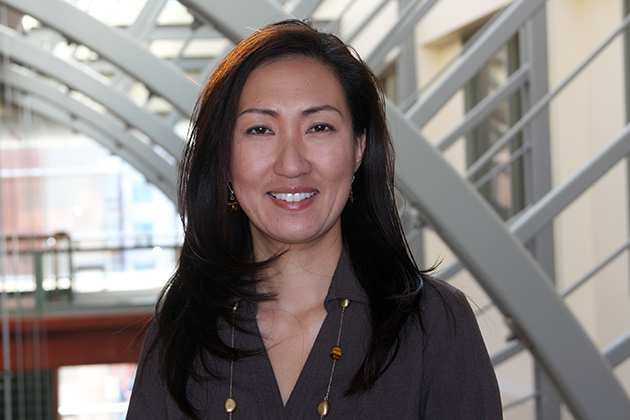
As the new director of Online Programs at the Neag School of Education, it’s Jae-Eun Joo’s job to ensure that students taking online classes – or pursing an entirely online degree – have an experience as rich, educational, and meaningful as those who sit in traditional UConn classrooms.
Joo’s role is to integrate effective pedagogy with new technologies, creating interactive online learning environments that implement research and best practices proven to help students learn most effectively and improve their performance.
“It’s both a conceptual and practical role,” she says, “that has me working very closely with faculty to identify how to best use emerging technologies to convey the content and the pedagogy they want to provide. We also want to provide students with the best possible – and an enjoyable – learning experience.”
Joo has spent much of the past 20 years as an online education researcher, teacher, and consultant, designing, managing, and evaluating online programs for the Harvard Graduate School of Education, the Open University in the United Kingdom, the World Bank, and other organizations. She earned a master’s in human development and psychology and a doctorate in learning and teaching from the Harvard Graduate School of Education.
Online courses and programs turn obstacles into opportunities.
Now an associate professor-in-residence in the Department of Educational Psychology, Joo teaches a graduate-level course, Interactive Learning Environments. And she serves as the Neag School’s liaison to the University of Connecticut’s growing, multidisciplinary eCampus program, which currently offers more than 100 undergraduate and graduate online classes, including Educational Leadership, Educational Psychology, and others taught by Neag faculty.
Her priorities include helping Neag faculty develop new online courses and programs; expanding Neag’s online degree offerings; and streamlining and strengthening the School’s three existing online programs in Gifted and Talented Education (master’s and sixth-year programs), Postsecondary Disability Services (certificate), and Educational Technology (master’s).
She is also leading and conducting research designed to advance and establish online and blended learning best practices, as well as disseminating the findings to increase the Neag School’s visibility in the field of online education.
Joo recently received the Education Research Service Projects (ERSP) Award from the American Education Research Association (AERA) to create a participatory evaluation study on a STEM (science, technology, engineering, and math) education program for Boston’s urban youth and their communities.
Although some are still hesitant to embrace online learning, a U.S. Department of Education survey, Evaluation of Evidence-Based Practices in Online Learning: A Meta-Analysis and Review of Online Learning Studies (2010), found that students taught in well-constructed online courses learn as much as, or surpass, those taught in face-to-face instruction; they also interact just as much with their professors.
“One of my goals is to construct a common framework for Neag online programs, which will help alleviate some of the misconceptions and unease felt about teaching and learning online,” Joo says. “I will be talking and reaching out to colleagues, alumni, and students – and potential students – to explain the innovative work we’re doing, show the benefits of online learning, and give people the education and encouragement they need to hopefully step out of their comfort zone and take a positive step into the online education world. It opens so many possibilities.”
Among the many benefits of online teaching, she notes, it provides people with open access and a flexible schedule that can help them overcome physical disabilities, transportation issues, and other challenges to earn a UConn degree that might otherwise not be possible.
“Online courses and programs turn obstacles into opportunities,” Joo says, “which is one of the reasons my job is so exciting and rewarding.”
Down the road, she envisions the Neag School of Education at the center of an “online content and resources superhighway,” providing Connecticut schools, libraries, teachers, administrators, and others with research data, a best practices library, classroom help, and the “many other much-needed supports and services that advanced education and the Neag School are known for. “
Adds Joo, “I’d love to build a connected, interactive, and robust online education platform that capitalizes on, and shares, all we’re doing to help teachers, education leaders, and their students.”


